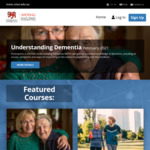Participants in the free Understanding Dementia MOOC will gain an increased knowledge of dementia, including its causes, symptoms and ways of responding to the needs of people living with the condition.
Course Description
The Understanding Dementia MOOC was developed by the Wicking Dementia Research and Education Centre based in the College of Health and Medicine at the University of Tasmania. This world-leading online course is free, easily accessible and available to everyone with an interest in dementia.
The ageing of human populations across the globe has contributed to dementia being identified as one of the public health issues of the 21st century. The MOOC curriculum addresses this health issue by drawing upon the expertise of neuroscientists, clinicians and dementia care professionals from both within the Wicking Dementia Research and Education Centre, and beyond.
Since 2013, the Understanding Dementia has received over 260,000 enrolments from all around the world. We invite you to join our community and learn about the diseases that cause dementia, how the condition affects the person with dementia, and how we can provide the best quality care.
Once the course commences, you will be able to log in to engage with the course content and activities, and share perspectives with other participants. The course is scheduled to close on 3rd May, 2021 at 5:00pm AEST.
To get the most out of this experience, you should expect to spend approximately 3 hours per week completing the course activities for the 7 weeks of scheduled content. The additional 3 weeks that the course is open is to allow you to catch up or revisit content.
The release of course content will occur at 9:00am (AEDT) on the following dates -
Module 1: Orientation - 16th February, 2021
Module 2: The Brain - 18th February, 2021
Module 3: The Diseases - 4th March, 2021
Module 4: The Person - 18th March, 2021
Module 5: Completion - 8th April, 2021 (AEST)
You can work through the content at any time of day and at your own pace within this release schedule. This includes revisiting earlier released content as needed.
Once you have completed the course, you will be eligible to download a free, personalised certificate of completion. We also offer paid enhanced certificates options in addition to the free certificate. There will be more information about this in the Completion module.
We look forward to your contribution, as an important member of the Understanding Dementia community.
Course Outline
The Brain
The Brain provides background content on basic nervous system anatomy and function, followed by a discussion of the diseases that cause dementia, current dementia research and future directions.
Nervous system anatomy
Anatomy with Body Central
Pathology of dementia
Future directions of dementia research
The Diseases
The Diseases explores differences between normal ageing and dementia, risk factors, issues surrounding diagnosis, as well as medical management.
Difference between normal ageing and dementia
Risk factors for dementia
Domains of dementia
Diagnosis of dementia
Younger onset dementia
Stages of dementia and focusing support
Medical management
The Person
The Person addresses difficulties in recognising symptoms, living with dementia, palliation, pain, dementia friendly communities, dementia inclusive design, and non-pharmacological therapies.
Insidious onset of dementia
Living with dementia
Dementia palliation
Non-pharmacological therapies
Behavioural and psychological symptoms of dementia
Pain and dementia
Advanced dementia symptoms and management
Dementia friendly communities
Dementia inclusive design


Is the course eligible for recognition of personal development hours for healthcare professionals?